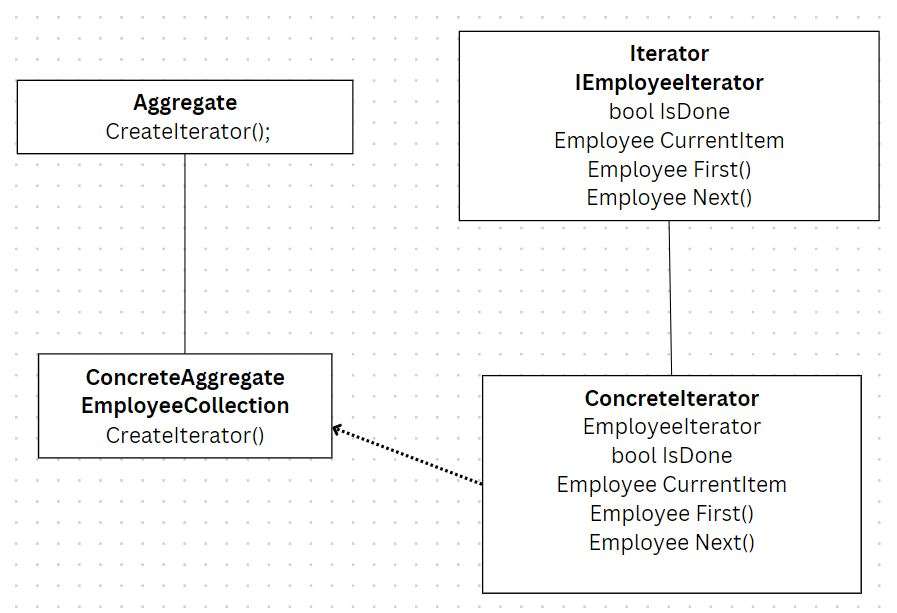- Behavioral pattern
- The intent of this pattern is to provide a way to access the elements of an aggregate object sequentially without exposing its underlying representation.
- Iterator:- defines an interface for accessing and traversing elements
- ConcreteAggregator :- implements the iterator creation interface to return an instance of the proper ConcreteIterator
- ConcreteIterator:- implements the Iterator interface and keeps track of the current position in the traversal of the Aggregate.
- Aggregate defines an interface for creating an Iterator object.

namespace Iterator_Pattern
{
public class Employee
{
public int EmployeeId { get; set; }
public string FirstName { get; set; }
public string LastName { get; set; }
public Employee(int employeeId, string firstName, string lastName)
{
EmployeeId = employeeId;
FirstName = firstName;
LastName = lastName;
}
}
public interface IEmployeeIterator
{
Employee First();
Employee Next();
bool IsDone { get; }
Employee CurrentItem { get; }
}
public interface IEmployeeCollection
{
IEmployeeIterator CreateIterator();
}
public class EmployeeCollection : List<Employee>, IEmployeeCollection
{
public IEmployeeIterator CreateIterator()
{
return new EmployeeIterator(this);
}
}
public class EmployeeIterator : IEmployeeIterator
{
private EmployeeCollection _employeeCollection;
private int _current = 0;
public EmployeeIterator(EmployeeCollection employeeCollection)
{
_employeeCollection = employeeCollection;
}
public bool IsDone => _current >= _employeeCollection.Count;
public Employee CurrentItem => _employeeCollection.OrderBy(e => e.EmployeeId).ToList()[_current];
public Employee First()
{
_current = 0;
return _employeeCollection.OrderBy(e => e.EmployeeId).ToList()[_current];
}
public Employee Next()
{
_current++;
if (!IsDone)
{
return _employeeCollection.OrderBy(e => e.EmployeeId).ToList()[_current];
}
else
{
return null;
}
}
}
}
PROGRAM.CS
using Iterator_Pattern;
EmployeeCollection emp = new EmployeeCollection();
emp.Add(new Employee(1, "Anurag", "Nayak"));
emp.Add(new Employee(2, "Abhishek", "Nayak"));
emp.Add(new Employee(3, "Shalin", "Bhanot"));
emp.Add(new Employee(4, "Manish", "Singh"));
var employeeIterator = emp.CreateIterator();
for (Employee employee = employeeIterator.First(); !employeeIterator.IsDone;
employee = employeeIterator.Next())
{
Console.WriteLine(employee?.FirstName + " " + employee?.LastName);
}
OUTPUT
Anurag Nayak
Abhishek Nayak
Shalin Bhanot
Manish Singh
GITHUB
